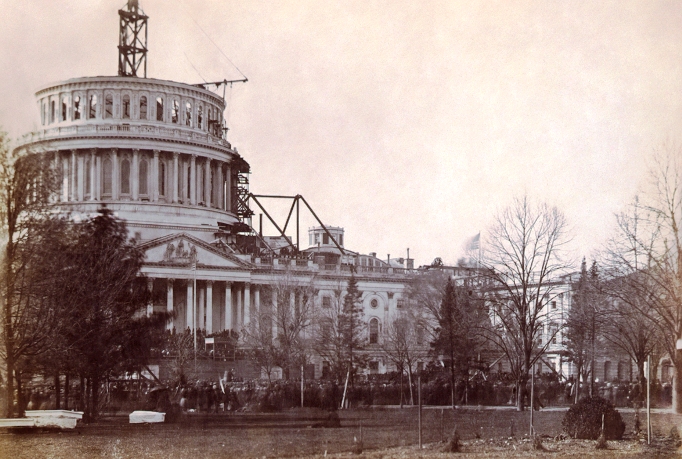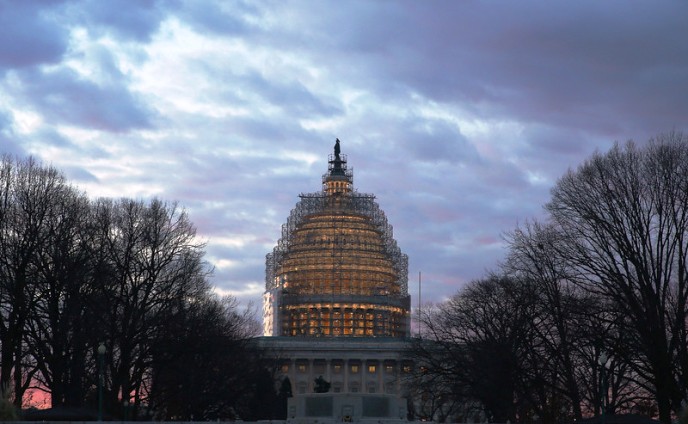
What do we not know about Lincoln that historians and authors think we should know about the much favored 16th president? Last Sunday’s New York Times Book Review offered reviews of three new books.
How many books, would you imagine, have been written about Lincoln?
According to the website, The Inquisitr (yes, that’s the way they spell it), “the people at Ford’s Theater Center for Education and Leadership decided to find out by building a tower in the lobby of the center with one copy of each book. Three stories later the magic number of books written about the 16th president of the United States turns out to be 15,000 titles.” (Me, I only have a measly 13.)
One of the reasons Lincoln remains timeless is due not only to his struggle to achieve freedom for all Americans, but his efforts to unite the Union after a great Civil War that took the lives of up to 700,000 Americans.
In Stephen Spielberg’s remarkable film, “Lincoln,” the Republican president is trying to reconcile the slave issue before a bitterly divided Congress. In one scene, Lincoln tells his radical republican rival, Thaddeus Stevens, “A compass … it’ll point you True North from where you’re standing, but it’s got no advice about the swamps and deserts and chasms that you’ll encounter along the way. If in pursuit of your destination, you plunge ahead, heedless of obstacles, and achieve nothing more than to sink in a swamp… What’s the use of knowing True North?”
I’m not sure that current political leaders in Washington know where True North is much less strive to move in the right direction.
In a book I return to frequently, “Lincoln on Leadership” by Donald T. Phillips, the author writes of an incredibly decent, yet strategic political act by Lincoln in his campaign for re-election.
“In the moments before Abraham Lincoln delivered his second inaugural address on March 4, 1865,” Phillips writes, “he was sitting next to Andrew Johnson, who would become the new vice president of the United States. Lincoln had dropped Hannibal Hamlin from the ticket and replaced him with Johnson, who had stayed in the Senate despite the fact that his home state of Tennessee had seceded and joined the Confederacy. This gesture of political and national reconciliation was disconcerting to some politicians at the time, because Lincoln (the first Republican to be elected president) had chosen Johnson despite the fact that he was a Democrat. However, the Lincoln-Johnson combination easily won victory by running on what they called the ‘Union’ ticket.
“On the inaugural grandstand that day, Lincoln could look up behind him and see that construction on the Capitol dome had finally been completed. Four years earlier, at Lincoln’s first inauguration, the dome had been less than half finished and was shrouded in scaffolding. Its completion was viewed by many at the time as symbolic of a four-year-long successful struggle to preserve a divided nation, which would now move forward united once again. …
“…upon taking office in 1861,” Phillips continues, “Lincoln inherited an unusually dire economic crisis. The financial panic of 1857, which had still not dissipated, was marked by a national recession with thousands of business and bank failures. The price of stocks and bonds fell sharply, there was a major spike in unemployment, and when it was feared that the U.S. government would not be able to pay its debts, the economic crisis spread around the world, particularly impacting Europe, the Far East, and South America. …
“Despite the bleak outlook, Lincoln proved unusually proactive in tackling the problem. Over the next four years, he would use the power of the federal government to both fund the war and provide financial stability to the country. …
“…Lincoln’s eminent integrity was reflected in his ability to make tough decisions. He knew that character is the very foundation of leadership and that, if the foundation has cracks in it, the entire structure can come tumbling down. …
“When Lincoln opened his [second inaugural] address ‘with high hope for the future,’ he was trying to inspire and reassure people by expressing optimism that things were going to get better, and that the future would be better than the past. … even as he said, if the war continued ‘until every drop of blood drawn with the lash shall be paid by another drawn with the sword.’ ”
Closing that address, Lincoln made clear his plea for reconciliation.
“With malice toward none, with charity for all; with firmness in the right as God gives us to see the right, let us strive on to finish the work we are in, to bind up the nation’s wounds, to care for him who shall have borne the battle and for his widow and his orphan, to do all which may achieve and cherish a just and lasting peace among ourselves, and with all nations.”

Lincoln’s words and Phillips description of the times in Washington are a reminder of the current situation in our nation’s capitol. Following a contentious election, we have a Republican Congress divided among themselves, and a president vowing not to overturn legislation he promised and delivered when he ran for office in 2008. All of this taking place under a capitol dome under reconstruction.
The critical question is this: can the president and congressional leaders come together and achieve unification while caring for all its citizens? Can they coalesce around those issues where they have common ground?
In a personal meeting on the outskirts of Washington near the end of the war, Lincoln met with Alexander Stephens, then vice president of the Confederate States of America who posed similar questions of unity.
“How have you held your Union together?,” Stephens asks in the film, “Lincoln.” “Through democracy? How many hundreds of thousands have died during your administration? Your union, sir, is bonded in cannon fire and death.”
“It may be you’re right,” Lincoln says. “But say all we have done is show the world that democracy isn’t chaos, that there is a great invisible strength in a people’s union? Say we’ve shown that a people can endure awful sacrifice and yet cohere? Mightn’t that save at least the idea of democracy, to aspire to? Eventually to become worthy of? At all rates, whatever must be proven by blood and sacrifice must have been proved by now. Shall we stop this bleeding?”
On a day we set aside as a national holiday in honor of Lincoln and Washington, political leaders should take time to reflect on reconciliation and the character necessary to implement it. They need to recognize that no matter how hard the path, no matter the political party, or ideological persuasion, they need to remember the past, and Lincoln’s vision for unity, in order to move into a future that should live up to our highest aspirations for all to enjoy.
Comments










